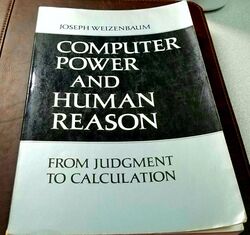Philosophy:Computer Power and Human Reason
 Book cover | |
| Author | Joseph Weizenbaum |
|---|---|
| Country | United States |
| Language | English |
| Genre | Nonfiction |
| Publisher | W. H. Freeman and Company |
Publication date | 1976 |
| Media type | |
| Pages | 300 |
| ISBN | 978-0716704645 |
Computer Power and Human Reason: From Judgment to Calculation is a 1976 nonfiction book by German-American computer scientist Joseph Weizenbaum in which he contends that while artificial intelligence may be possible, we should never allow computers to make important decisions, as they will always lack human qualities such as compassion and wisdom.[1]
Background
Before writing Computer Power and Human Reason, Weizenbaum had garnered significant attention for creating the ELIZA program, an early milestone in conversational computing. His firsthand observation of people attributing human-like qualities to a simple program prompted him to reflect more deeply on society's readiness to entrust moral and ethical considerations to machines.[2]
Reception and legacy
Computer Power and Human Reason sparked scholarly debate on the acceptable scope of AI applications, particularly in fields where human welfare and ethical considerations are paramount. Early academic reviews highlighted that Weizenbaum's stance pushed readers to recognize that even as computers grow more capable, they lack the intrinsic moral compass and empathy required for certain kinds of judgment.[3][4][5]
The book caused disagreement with, and separation from other members of the artificial intelligence research community, a status the author later said he'd come to take pride in.[6]
See also
References
- ↑ Hines, Dwight (1980). "Review of Computer Power and Human Reason: From Judgment to Calculation". The Journal of Mind and Behavior 1 (1): 123–126. https://www.jstor.org/stable/43852815. Retrieved December 5, 2024.
- ↑ "Joseph Weizenbaum, pioneering AI researcher and critic, dies at 85". MIT News. March 10, 2008. https://news.mit.edu/2008/obit-weizenbaum-0310.
- ↑ Loeb, Zachary (2021). "The lamp and the lighthouse: Joseph Weizenbaum, contextualizing the critic". Interdisciplinary Science Reviews 46 (1-2): 19–35. https://journals.sagepub.com/doi/abs/10.1080/03080188.2020.1840218. Retrieved December 5, 2024.
- ↑ Bassett, Caroline (2019). "The computational therapeutic: exploring Weizenbaum's ELIZA as a history of the present". AI & Society 34 (4): 803–812. https://link.springer.com/article/10.1007/s00146-018-0825-9. Retrieved December 5, 2024.
- ↑ NewsHour Productions (Producer). "Electronic Teaching". The MacNeil/Lehrer Report. American Archive of Public Broadcasting. Retrieved December 5, 2024.
- ↑ "Joseph Weizenbaum, Famed Programmer, Is Dead at 85". The New York Times. March 13, 2008. https://www.nytimes.com/2008/03/13/world/europe/13weizenbaum.html.
External links
 |
